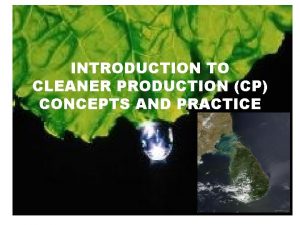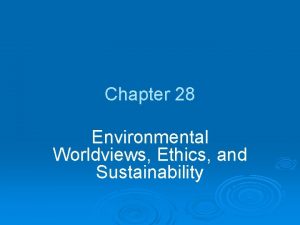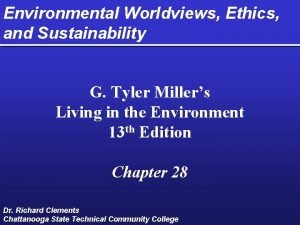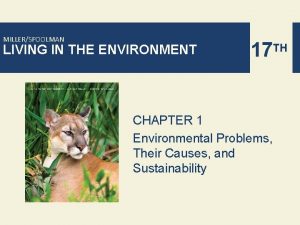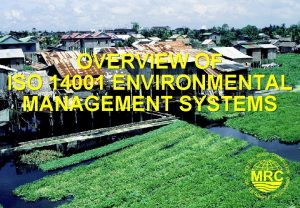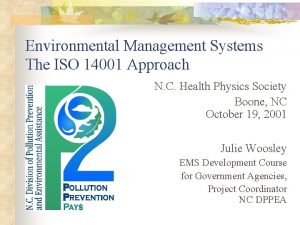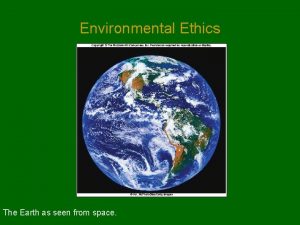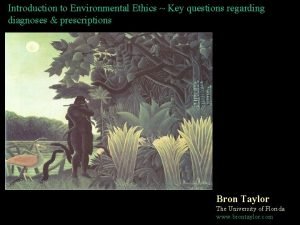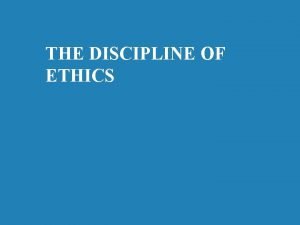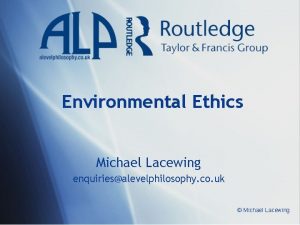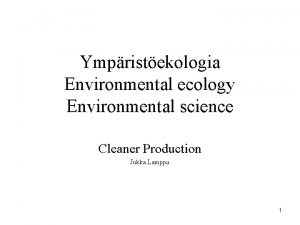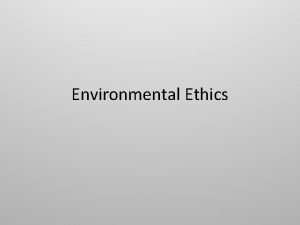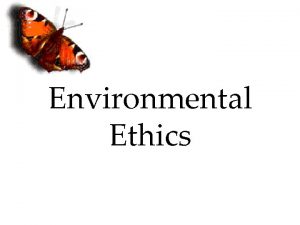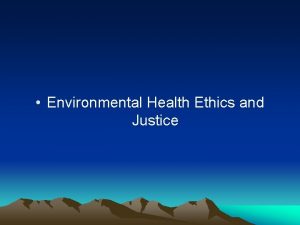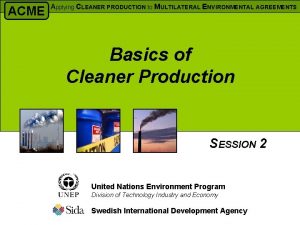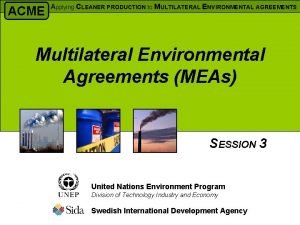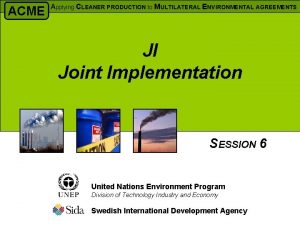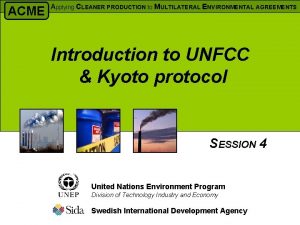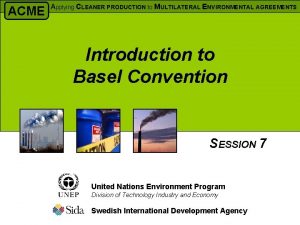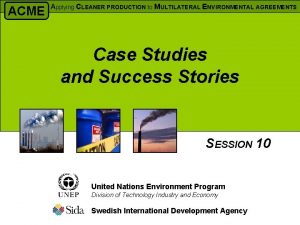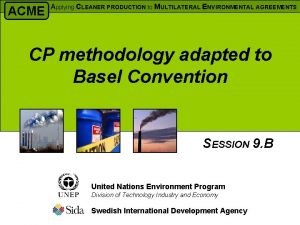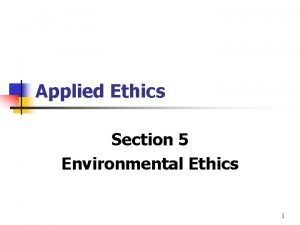Introduction to Environmental Ethics and Policy Cleaner Production
























- Slides: 24

Introduction to Environmental Ethics and Policy Cleaner Production 30. 11. 2006 Simo Kyllönen Faculty of Social Sciences

Content n Introduction to theories of environmental ethics n The ethical foundations of environmental policy and law n Sustainable development as an environmental policy principle

Ethical questions concerning e. g. the use of natural resources 1. Why natural resources should or shouldn’t be used? ➡Yes, because they fulfill the vital needs of the people. ➡No, because the use compromise the vital needs of future generation; because it is polluting. . . 2. How they should or should not be used ➡Using only the best available technology, recognising the rights of local people. . . 1. How the benefits and costs of the use should be distributed? ➡ In proportion to ownership, to financing, to merits, to vulnerability. . . 3

Ethical reseach Descriptive ethics Philosophical ethics - sociological surveys on people‘s the ethical values and opinions. - what people think to be ethical? - ethical theories - what are justified ethical principles? Normative ethics Meta-ethics What is ethical according to these principles? What is ‚ethical‘? What do we mean by ethical concepts? Applied ethics - applying ethical principles in every day questions: e. g. professional ethics, business ethics, bioethics, environmental ethics Social conventions, habits Religions Scientific research 4

Environmental ethics n The moral objects: Who and which things are to be taken into account in ethical consideration? n closest fellow-citizens n all humans, including future generations n all things that are valuable for human well-being n all beings that can suffer pain n all self-consciousness beings n n The moral agents: Who can be taken as ethically responsible? 5

Traditional antropocentric environmentalism n Morally relevant objects include humans and things that are valuable for human well-being -> nature only instrumentally valuable n Conservationism: the sustainable and wise use of natural resources. Gifford Pinchot (1865– 1946) n Preservationism: the preservation of “wild” and pristine nature. John Muir (1838– 1914) 6

“First environmental crisis” 1960 -70 n Accidental local and regional problems (DDT) n Limits of natural resources (oil crisis) n Animal suffering 1962 1975 7

1. Respond: Biocentric environmentalism Biocentric view questions: - why only humans are morally relevant? Nature Ethics and moral 8

Biocentric theories: n Morally relevant are also: n animal n the suffering -> animal rights theories, Peter Singer ”natural good” of all natural organisms, species populations and life communities n ecological holistic entities including inanimate nature -> Deep Ecology (Arne Naess) and Land Ethics (Aldo Leopold) 9

2. Respond: Social ecoloy and ecofeminism Nature Ethics, rights, justice Social ecology questions: -environmental problems are social problems -caused by the same hiearchical and unjust mechanisms that cause rasims, sexism and third world exploitation. 10

Discussion questions ➡What ethical question have you faced in relation to environment or nature? ➡Do you recognise following some ethical principle in these situations? 11

The ethical foundations of environmental policy and law n Our ethical standpoint reflects to the environmental law and policy: n what kind rights and duties we have in relation to nature? - substantive rights to healthy environment - participatory rights to the access to information, public participation, in decision-making and access to justice in environmetal matters n what kind of policy principles we use? - cost/benefit analysis - avoiding environmental harm - protecting the vulnerable - precautionary principle - sustainability 12

Rights and duties Rights -moral rights -legal rights Duties -moral obligation -legal duty n moral and legal claim-rights imply that somebody has a corresponding duty to recognise that right n If I have (legal) right to the healthy environment then society has to duty to guarantee that this right is not violated due pollution etc. n If morally relevant objects could have a status of legal right-holder, somebody has a legal duty to recognise this right. -> animal rights 13

Substantive and participatory environmental rights n The Aarhus Convention on environmental rights n Included also in Finnish Constitution and environmental legislation n Substantive rights to healthy environment, problems: n What determines the “healthy environment” in each occasion? n Environmental problems considered only by the affects to human health? What about other environmental qualities, e. g. biodiversity? n Participatory rights: people can participate to decision making concerning their environment: e. g. what is healthy? 14

Participatory rights n Guarantee that the environmental decisions are made democratically: fair participation of all stake-holders and local people n Inform the people about the environmental matters n Inform the authorities and decision makers about the local environmental problems n Help the people to protect and improve their environment n Strengthen the public support for decision on the environment n More transparent and legitimate governance: n provides citizens the juridical means to control the authorities n provides citizens means to compare the alternatives and to demand justifications for decisions 15

Rights of the nature? n Nature as a right-holder, problems: n lack of correspondence and reciprocity n problems to determine “natural good” of the animals, plants, ecosystems n problem of representation: who is justified to represent nature? n This does not mean that n natural entities could not have some legal rights (they do have) n they wouldn’t have moral worth that would imply moral duties to us n Simply: rights are not always appropriate way to address ethical questions in environmental matters 16

Discussion questions n What kind of environmental rights and duties can you recognise to have? n Are there any legal ones? 17

“Second environmental crisis” 1980 -2000 n Problems are global and intergenerational n Addressing them requires scientific research n They can lead to catastrophic and irreversible effects 1984 1987 2001 18

Respond 1: Ethical principles for environmental decision making 1. Avoiding harm ➡ Polluter pays principle 2. Keeping options open (reversibility) ➡ Precautionary principle 3. Comparing the alternatives ➡ Environmental Impact Assessment 3. Protecting the Vulnerable 1. Maximising sustainable benefits 6 19

Precautionary principle n ”Where there are threats of serious or irreversible damage, lack of full scientific certainty shall not be used as a reason for postponing cost-effective measures to prevent environmental degradation. ” n Preventive anticipation n Safeguarding of ecological buffer-zones or safety margins n Weighting the future cost of inaction to current benefits more fairly n Onus of proof to those who propose change from those who oppose it. 20

Respond 2: Sustainable development n Brundtland Commission 1987: n ”Sustainable development that meets the needs of the present without compromising the ability of future generations to meet their own needs. It contains within two key concepts: • the concept of ’needs’, in particular the essential needs of the world’s poor, to which oveeriding priority is given • the idea of limitations imposed by the state of technology and social organization on the environment’s ability to meet present and future needs. ” 21

What to sustain and how much? n Depends on three issues: n the extent of substitutability we believe to exist for natural resources used in need satisfaction n the extent we believe natural prosesses and systems to be critical or valuable n the degree of risk-aversion we feel. n This leads to: n most weak: neo-classical economist’s sustainability n critical natural capital n protecting n most the irreversible nature strong: protecting the intrinsic value of nature (cf. deep ecology) 22

Sustainable development as a policy principle n Ecological constraints and margins (ecological sustainability) n The human essential needs and well being not only material but comprise also they basic human and democratic rights (social sustainability) n It emphasise thus mechanisms of decision-making: n they informational quality and competence n democratic n legitimacy fairness and public agreement n Economical means that can recognise these two. 23

Discussion questions: n What do you think to be most important in sustainable development? n How your field of action could be made more sustainable? what would be the first steps? 24
 Diagram alur produksi
Diagram alur produksi Cleaner production principles
Cleaner production principles Cleaner production principles
Cleaner production principles Chapter 2 economics and environmental policy
Chapter 2 economics and environmental policy Gmu environmental science and policy
Gmu environmental science and policy Stewardship worldview
Stewardship worldview Earth centered worldview
Earth centered worldview Environmental ethics issues and possible solutions
Environmental ethics issues and possible solutions Ethics of food production and consumption
Ethics of food production and consumption Macroethics definition
Macroethics definition Wireless health
Wireless health Iso 14001 environmental policy examples
Iso 14001 environmental policy examples Mobil livesco
Mobil livesco Iso 14001 environmental policy statement examples
Iso 14001 environmental policy statement examples William baxter penguins
William baxter penguins Approaches to environmental ethics
Approaches to environmental ethics Environmental ethics questions
Environmental ethics questions Descriptive ethics
Descriptive ethics Environmental ethics
Environmental ethics Environmental ethics issues
Environmental ethics issues Environmental ethics objectives
Environmental ethics objectives Ethics of money production
Ethics of money production Producers
Producers Yamalube visor and helmet cleaner
Yamalube visor and helmet cleaner Non cognitivism
Non cognitivism

